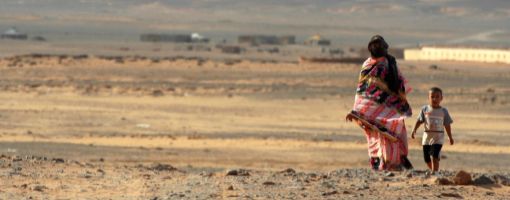
A UN study completed this year investigated the nutritional status in the Western Sahara refugee camps in Algeria. The study found that 7,6 percent of children are acutely malnourished, 16,7 percent are underweight, and 25.2 suffer from stunting. [Updated article]
A large study among 2049 households (including 2208 children and 1121 women) in the Western Sahara refugee camps in Algeria show that there are large degree of malnutrition. The study is made by UNHCR and WFP.
Download the study report here.
Four nutritional surveys were conducted, one in each of the Western Sahara refugee camps (Laayoune, Awserd, Smara and Dakhla), in November 2012.
The aim of these surveys was to establish a detailed mapping of the current nutritional profile of the population, which has always been considered precarious. These four surveys also aimed at providing detailed follow-up information and analysis for evaluating the impact of a Anemia and Stunting Reduction Programme. This programme provided Micro-Nutrient Powder (MNP) to pregnant and lactating women (PLW) and children aged 36-59 months, and a Lipid-based Nutrient Supplement (LNS) to children aged 6-35 months, with the aim of reducing the very high anemia prevalence in children aged 6-59 months and PLW, as well as to reduce the high levels of stunting in children.
Two population groups were included in the survey; children aged 0-59 months and women of reproductive age aged 15-49 years.
Important notice: NEW version of report
The link made above is a new version of the nutrition report previously published on this website. The finalised report of May 2013, circulated from November 2013 and published on vest-sahara.no on 24 Nov 2013 was not the final version. The report linked to above, labelled "DRAFT", dated March 2014, is the final version from the UNHCR.
The new final version contains 27 changes from the old version - all 27 changes removing the words "Western Sahara" from the report. The word "Morocco" has also been removed from the final version. There are no other changes to the document, including in the findings. In most places the words "Western Sahara" have been changed to "Saharawi" or been deleted. As far as we know, it is the first time a UNHCR refugee nutrition study from the camps fails to mention the name of the territory the refugees fled from. The name of the territory of origin of the refugees is gone.
The new report goes to great lengths to remove any reference to the name of the territory - even by altering the representation of another UN document. A footnote reference to the UN document "UNHCR/WFP Joint Assessment Mission Assistance to Refugees from Western Sahara. Algeria. 27 September to 9 October 2009", which was made in the original version, has been renamed to "UNHCR/WFP Joint Assessment Mission Assistance to Saharawi Refugees. Algeria. 27 September to 9 October 2009". On another place, that reference has been deleted entirely, and is the only footnote removed from the report. Another footnote, referring to the UNHCR/WFP Nutrition Survey, Western Sahara Refugee Camps, Tindouf, Algeria, published April 2011, has been renamed also to "Saharawi refugee camps".
There have furthermore been made changes in the Terms of Reference and in the name of the entire nutrition survey. The finalised version of May 2013 - which was later renamed a draft - was named Nutrition Survey Western Sahara Refugee Camps, Tindouf, Algeria" - in line with former such studies. The new version, however, finalised in March 2014 but yet marked as "draft" - carries the title "Nutrition Survey Saharawi Refugee Camps, Tindouf, Algeria".
For an insight to the pressure that Morocco exerts on the UNHCR to change wording of its reports on Western Sahara refugees (who fled during the illegal Moroccan invasion of the non-self-governing territory) see confidential Moroccan cables dated 6 July 2012 and 9 July 2012 published in October 2014 by the anonymous Tweeter @Chris_coleman24. In this letter on 2 May 2014 [page 1, page 2], the Moroccan Ministry of Foreign Affairs writes to its mission in Geneva regarding the UNHCR report's reference on the website of the Norwegian Support Committee for Western Sahara.
"Exile is like pneumonia, you need antibiotics to treat it. In this case, the antibiotics are the political solution. I cannot offer them. I only have aspirin to relieve some of the pain", UN High Commissioner for Refugees António Guterres said upon visiting the refugees in 2009.
Mentioning the name of the territory that the refugee fled from could be a good contribution to address the question.
Order our Western Sahara poster!
“Try to Visit Western Sahara”…
The Security Council fails Western Sahara and international law
On 31 October 2025, a new resolution was adopted in the UN Security Council calling on the Saharawis to negotiate a solution that would entail their incorporation into the occupying power, Morocco.
Saharawis Demonstrate Against Trump Proposal
The United States has proposed in a meeting of the UN Security Council on Thursday that the occupied Western Sahara be incorporated into Morocco.
Skretting Turkey misled about sustainability
Dutch-Norwegian fish feed giant admits using conflict fishmeal from occupied Western Sahara. Last month, it removed a fake sustainability claim from its website.



